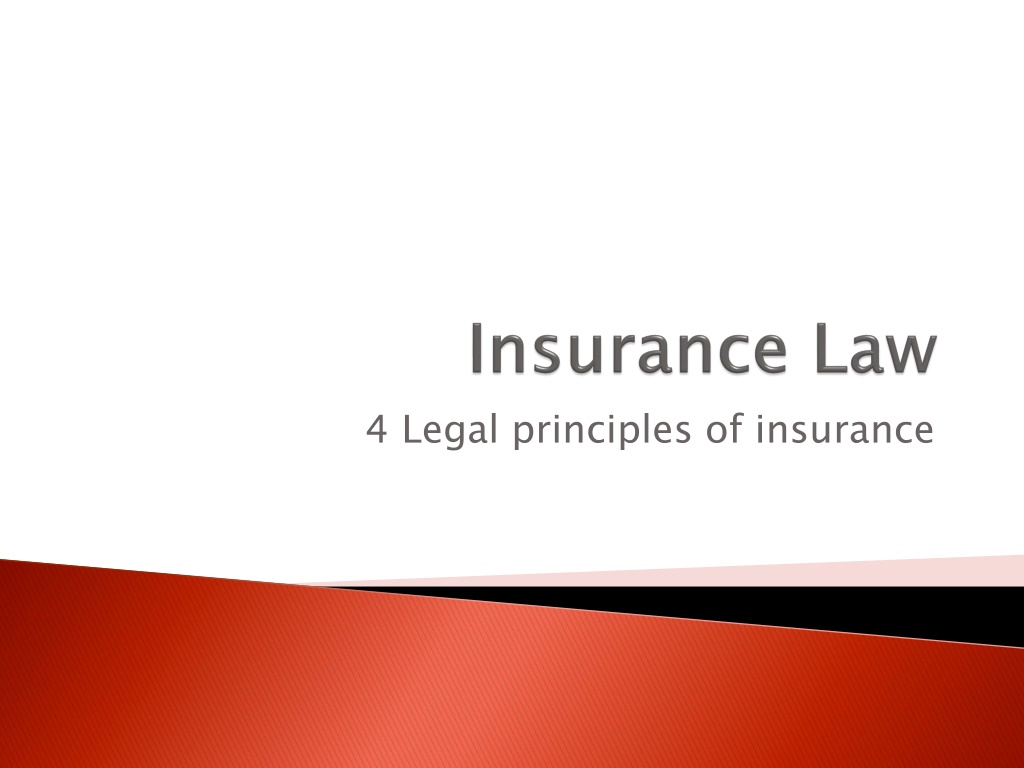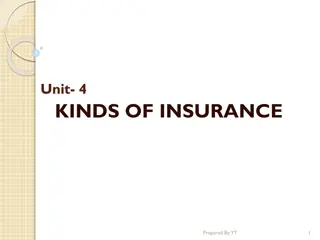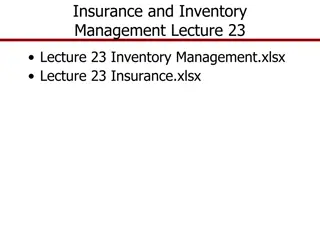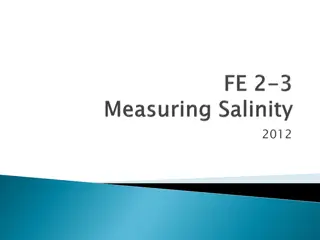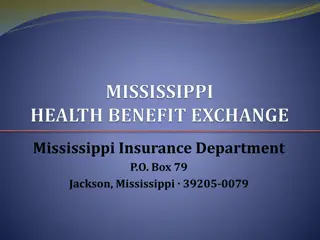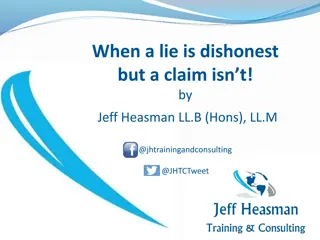Legal Principles of Insurance
The legal principles of insurance include indemnity, insurable interest, subrogation, and utmost good faith. These principles ensure fair compensation, financial risk protection, and honesty in insurance contracts. Understanding these principles is crucial for both insurers and policyholders to navigate the insurance process effectively.
Download Presentation

Please find below an Image/Link to download the presentation.
The content on the website is provided AS IS for your information and personal use only. It may not be sold, licensed, or shared on other websites without obtaining consent from the author. Download presentation by click this link. If you encounter any issues during the download, it is possible that the publisher has removed the file from their server.
E N D
Presentation Transcript
1. The principle of indemnity 2. The princile of insurable interest 3. The principle of subrogation 4. The principle of utmost good faith
The insurer should not pay more than the actual amount of the loss. The insured should not profit from a covered loss.
The concept of actual cash value supports the principle of indemnity. How to determine actual cash value? Replacement cost less depreciation Fair market value Broad evidence rule
A contract of indemnity does not mean that all coverd losses are always paid in full. There are various reasons why the amount paid is often less than the actual loss.
Valued amount of insurance if a total loss occurs. Valued payment of the face amount of insurance to the insured if a total loss to real property occurs from a peril specified in a law. Replacement deduction determining the amount paid for a loss. Life Valued policy policy - policy that pays the face Valued policy policy laws laws - provisons that requires Replacement cost cost insurance for insurance physical - there is no depreciacion in Life insurance insurance
The principle of insurable interest states that the insured must be in a position to lose financially if a covered loss occurs. Insurable interest may be defined as true, valid, determinable, and direct economic stake of an insurance policy holder (or of the beneficiary of the policy) in the continued existence or safety of the insured property or person. An insurable interest is a stake in the value of an entity or event for which an insurance policy is purchased to mitigate risk of loss. Insurable interest is a basic requirement for the issuance of an insurance policy, making it legal and valid and protecting against financial loss from an event do not have an insurable interest and cannot purchase an insurance policy to cover that event. intentionally harmful acts. Entities not subject to
An insurable interest is a stake in the value of an entity or event for which an insurance policy is purchased to mitigate risk of loss. Insurable interest is a basic requirement for the issuance of an insurance policy, making it legal and valid and protecting Entities not subject to financial loss from an event do not have an insurable interest and cannot purchase an insurance policy to cover that event. against intentionally harmful acts.
The principle of subrogation is pertinent to principle subrogation has relevance only for contracts of indemnity. of indemnity. That means that Life insurance not a contract of indemnity but valued policy.
Subrogation is referred to substitution of the insurer in place of the insured for the purpose of claiming indemnity from a third party for a loss covered by insurance. The insurer can recover from a negligent third party any loss payments made to the insured.
The principle of utmost good faith is also called the prinicple of uberrimae fidei. According to this principle, the insurance contract must be signed by both parties in an absolute good faith or belief or trust. The person getting insured must willingly disclose and surrender to the insurer his complete true information regarding the subject matter of insurance. The insurer s liability gets voidable (may be legally revoked or cancelled) if any facts, about the subject matter of insurance are either omitted, hidden, falsified or presented un a wrong manner by the insured.
There is a higher degree of honesty imposed on both parties to an insurance contract than in case of other contracts. The principle of utmost good faith is supported by three important legal doctrines: 1. Representations, 2. Concealment, 3. Warranty.
Representations are statements made by an applicant for insurance. The insurer can deny payment for a claim if the representation is material and false, and is relied on by the insurer in issuing the policy at a specified premium. In the case of statements of belief or opinion , the misrepresentation must be also fraudulent before the insurer can deny a claim.
A concealment (nondisclosure) is intentional failure of the applicant for insurance to reveal a material fact to the insurer. The legal effect of a material concealment is the contract is voidable at the insurer s option. same as a misrepresentation the
Warranty is a statement that becomes part of the insurance contract and is guaranteed by the maker to be true in all respects. Based on common law, any breach of the warranty, even if slight, allowed the insurer to deny a payment of claim.
Principle of causa proxima (nearest cause) Principle of loss minimization
Principle of proximate (nearest) cause, means when a loss is caused by more than one causes, the proximate or the nearest or the closest consideration to decide the liability of the insurer. cause should be taken into This insurance. principle does not apply to life
According to this principle the insured must always try his best to minimize the loss of his insured property. The insured must take all possible measures and neccessary steps to control and reduce the losses in case of insurance event, e.g. fire, flood. The insured must not neglect and behave irresponsibly during such events just because the property is insured. Hence it is a responsibility of the insured to protect his insured property and avoid further losses.
